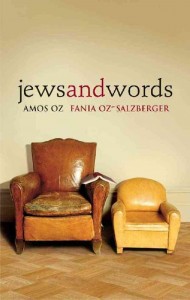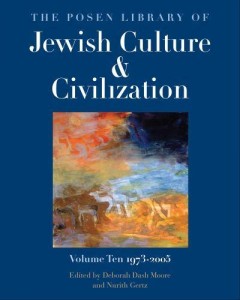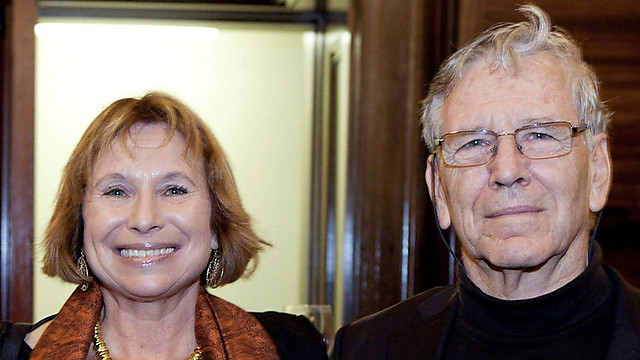Hanukkah Book Review: “Jews and Words” — More Than Tongue Can Tell
At first glance, Oz and Oz-Salzberger’s Jews and Words seems to be an unexceptional if elegantly written and occasionally witty contribution to the Jewish bookshelf.
Jews and Words by Amos Oz and Fania Oz-Salzberger. Yale University Press, 232 pages, $25.
By Debra Cash
Over the past two decades, the North American Jewish community has spent many hours and many dollars bemoaning, studying, and issuing reports on its “crisis of continuity.” Young Jews—especially those of Gen Y and Gen Z—are to a large extent not joining established denominational synagogues, are marrying people of other faiths/colors (not to mention of the same gender), and are taking a free-form, digitally-mediated perspective on their spiritual practices and places in the public world. Significantly, some have argued, they are no longer convinced by the messages of political Zionism as a pillar of Jewish self-determination (see, as its exemplar, New Republic writer Peter Beinart’s controversial 2010 New York Review of Books essay “The Failure of the American Jewish Establishment.” Jewish social justice values have become indistinguishable from liberal secular humanist ones. The young folks are all Obama voters now.
Into this conversation comes the strangest commission in a while, Jews and Words by Amos Oz and Fania Oz-Salzberger. Amos Oz is, of course, the prolific, Israeli novelist, memoirist, Peace Now activist, and reputed Nobel laureate short-list candidate. Fania Oz-Salzberger is his adult daughter (b.1960), a historian of, among other things, the German-Jewish Enlightenment.
Jews and Words was commissioned by The Posen Library of Jewish Culture and Civilization, which, according to Yale’s marketing is “a landmark project to catalogue, preserve, and share Jewish culture from around the world, ranging from biblical times to the twenty-first century.” The book is the introductory salvo to that ambitious 10-volume (print and online) alternative to the 26-volume Encyclopedia Judaica. The series editors include New England scholar James E. Young, professor of English and Judaic Studies at the University of Massachusetts Amherst along with the gifted feminist historian Deborah Dash Moore and Israeli scholar Nurith Gertz. The scholarly advisory board is admirable; the upcoming Volume 9, covering 1939-1973 and edited by the great, Canadian-American Yiddishist David Roskies and Warsaw Ghetto expert Samuel Kassow, should be a Jewish Studies blockbuster. The Posen volumes are scheduled to be released in reverse chronological order, with a free searchable database available starting this coming spring.
At first glance, Oz and Oz-Salzberger’s English-language original seems to be an unexceptional if elegantly written and occasionally witty contribution to the Jewish bookshelf. Who, after all, would disagree that the People of the Book (well, a few really big and influential ones) are not great readers, great writers, and great talkers? The very origins of the sense of Jewish community, the authors say, is a concept of peoplehood “centered on textual memory”: the memory of a text shared orally and inscribed as letters on stone at Mt. Sinai, as well as the more historically demonstrable institution of regular recitation of those foundational texts. They note “in Jewish tradition every reader is a proof-reader, every student a critic, and every writer, including the Author of the universe, begs a great many questions.”
Me, I’m willing to give God a pass on question-begging but Oz and Oz-Salzberger? Not so much.
The Hebrew Bible, Oz and Oz-Sulzberger argue, is “a magnificent human creation. Solely human. We love it and we question it.” If any readers don’t agree with that baseline, they can stop reading after this statement on page four. But most American Jewish readers have agreed with that assertion, to a greater or lesser degree of awareness, since scholars started working out the documentary hypothesis in the late eighteenth century.
Oz and Oz-Salzberger hop and skip among Jewish sources, scattering anecdotes and quotations from the Bible, Talmud, Spinoza, Yehuda Amichai, and Michael Chabon with a sometimes smug tone of “we bet you didn’t know this reference.” (Oz and Oz-Salzberger, for instance, are hardly the first to suggest that the speaker/author in much of the Song of Songs could be a woman.) Many of the stories they choose are ones where apostates and secular Jewish intellectuals win the day.
Some poetic-sounding assertions are ahistorical: “Did any converso mother as the day darkened in post-1492 Spain, ever dare to whisper to her baptized children a few words from the ancient Hebrew grace before the meal . . . hoping against hope that they would pass it on?” Well, yes, as a matter of fact, she did. The literary product remains in the Hebrew-derived lyrics to Spanish Jews’ Ladino songs and the memoirs of their dispersed communities in places like Alexandria, Salonika, and the Balkans.
This would be nitpicking if Jews and Words didn’t include two omissions that are so overt that they can only be deliberate. The first is the almost complete erasure of prayer, including traditional Jewish liturgy and metaphor, as a literary wellspring of Jewish consciousness. The kibbutznik-bred Oz family is so strictly secularist, so busy asserting that one can identify as a Jew while remaining a staunch nonbeliever (they don’t even like the word Judaism), that prayer barely merits a mention beyond the “musicality” of reiterated lines that are compared to the lullabies that soothe children to sleep.
The second is the elision of the idea of peer study, hevrusah. Oz and Oz-Salzberger take great pains to discuss how Jewish texts, especially before the invention of the printing press, were transmitted between father (and marginally, mother) and son (with girls in less enlightened times and families listening in when they could) and from teacher to student. Then they go on to talk about “peer adversaries,” describing how “Jewish scholarship was, and is, enthusiastically disputive,” their key example being the diametrically opposed, first-century CE scholars Hillel and Shammai.
But peer study is not, and never was, limited to two masterly disputants. Dyadic learning between a pair of yeshiva students was a way of digging deep. In a very real way, it models not just disputation but shared and open-ended exploration. Not mentioning this important and still relatively unique Jewish pedagogical modality is a huge oversight. It is the equivalent of saying that the only people who are entitled to their opinions are experts.
In Jews and Words, Oz and Oz-Salzberger reduce the debate about Jewish continuity and more centrally, twenty-first century, Jewish identity to a library card, internet access and possibly a few adult education classes. “An informed progeny is the key to collective survival,” they write. I’m not against being informed, has ve’halilah (heaven forbid!), and support communal funds being put squarely in the service of trying to make it so, but the literal survival of Jewish identification in both Israel and the Diaspora is far, far more dependent on the pressures of the surrounding communities than either Oz father or daughter want to admit. It wasn’t a lack of Jewish knowledge that led to their own Lithuanian Jewish family being wiped off the face of central Europe. And in the future, Jewish persistence will not come from Jews’ mastery of Hebrew or translation of the multilingual wealth of Jewish texts into English, as much as I personally will take happy advantage of access to them. The key to collective survival is far more likely to be what Jewish people and others try to do with that information than the degree to which they are literary cognoscenti.
The authors live within an Israeli society that “increasingly identifies Bible-quoting, Talmudic reference, and even a mere interest in the Jewish past, as a politically colored inclination, at best atavistic, at worst nationalistic and triumphalist.” While Bible-true fundamentalism may be a problem, or a scourge, in Israel as it is across world religions, this is hardly a pressing issue for North American Jews. Among religious American Jews, studying Talmud is apt to be a private communal affair; among the less conventionally pious, it qualifies as a meaningful intellectual or spiritual leisure-time activity. The authors, who have absorbed many of the lessons of Jewish feminism, decry the Israeli ultra-Orthodox demand “to silence women’s voices and erase or blur female images in the public sphere.” A recent conflict over images of women wearing short sleeves on bus posters ads, pulled to avoid ultra-orthodox objections, as well as the distressing abuse of Anat Hoffman, a leader for egalitarian prayer in Jerusalem demonstrate that these are real issues over real stakes. Given that religious parties in Israel have significant political control over the role of women in the public sphere, these are injustices worth addressing.
Nonetheless, these are not problems for North American Jews. Those who don’t want to be confronted with pictures of women with their arms showing or who care about whether women wear a prayer shawl are not likely to read Jews and Words. Remember, they stopped reading at page four.
The Posen Library editors must have been pleased that they arranged for an A-list writer and his distinguished academic daughter to write Jews and Words, but they are giving the American concern with continuity an Israeli answer. Jewish nationalism was meant at least in part to solve the problem of continuity—creating a safe haven from intermittent pogroms and systematic genocide—as well as to restore the continuity of a broken exile. (It’s not uncommon for present-day Zionists to refute the idea that the Jewish state is an expression of European colonialism by noting that when nineteenth- and twentieth-century Jews arrived in the Middle East, archeologists were able to dig up the shards and mosaics of preexisting, pre-modern Jewish history). We make ourselves out of our culture, but we take from that culture what matters to us. This is what sociologists have called a quest for a “usable past.”
Lastly, what’s with the cover? In an appalling lapse of judgment, Yale University Press has marketed this book with an image of two leather chairs, the larger of which has a book left open, unattended, on its arm. This, kinderlach, is an image of Papa Bear reading to Baby Bear. It’s literally paternalistic. But in a world where adult readers navigate through our own books and journey through literary archipelagos on our own and where, I hasten to add, Baby Bear the Historian has no doubt read and digested books that Papa Bear the Novelist doesn’t have time for, we all deserve to be grownups.
If we American Jews are not grownups, we can’t be expected to address the challenges of our own diasporic twenty-first century.
Debra Cash, a founding contributor to the Arts Fuse now serving on its Board, is Executive Director of Boston Dance Alliance and a longtime member of the Authors Guild.
c 2012 Debra Cash
Tagged: Amos-Oz, Fania Oz-Salzberger, Jews and Words, The Posen Library of Jewish Culture and Civilization




Provocative review Debra, that raises so many good points about Oz, Israel and the project of representing and curating Jewish culture. Thank you!
Debra Cash writes: “While Bible-true fundamentalism may be a problem, or a scourge, in Israel as it is across world religions, this is hardly a pressing issue for North American Jews.”
It isn’t? So neither Christian nor Jewish fundamentalism is a problem here? Really? Didn’t GW Bush slip the word “crusade” into his crazed justification for the march on Baghdad? Don’t an absurdly high percentage of Americans disbelieve in evolution and accept creationism a la the first book of Bible/Torah? Isn’t fundamentalism a main reason Americans have such a hard time accepting fact and science based proofs of climate change?
Today I read in the NY Times about a Jewish man who was burned by a cup of bleach thrown in his face in Brooklyn. He was known in the closed world of Satmar Hasidism for defending the right of victims of sexual abuse to stand up to their molesters in the courts. This has made him a pariah and a target. You don’t have to go to Israel to discover such things.
If Amos Oz and Fania Oz-Salzberger have provided a consistently secular approach to being a Jew, I honor it. Secular Jewishness has lost ground in this country to religion and religious education. Perhaps that’s irreversible but I hope not.
*Of course* Christian fundamentalism is a problem here. I wasn’t asleep during the recent Presidential campaign, I can assure you. But most American Jewish men and women are free of oppression by Jewish *religious authorities*, don’t care what they think, and may not even be aware of their disapproval.
The terrible case in Brooklyn was within, as you say, the tight world of the Satmar. Even the terrible situation of “agunot,” women who cannot get a Jewish divorce from their husbands, is only a problem for those who accept certain types of religious authority and want approval from and access to remarriage within a certain religious community.
I am not arguing that Jewish people in the U.S. can’t or shouldn’t identify themselves as secular. (As they say, “some of my best friends…” In fact, some of my best relatives.) What I am saying is that the Ozs’ book is so eager to distance itself from any claim by religion that they go into peculiar contortions to avoid speaking of prayer or rituals or anything that has to do with historical Jewish religious practice.
A great resource on the history of Jewish secularism is David Biale’s 2011 book Not in the Heavens. As he notes “Secularism can make no promise of continuity or survival, but it does guarantee the freedom to experiment, without which neither continuity nor survival is possible.”
Debra,
Thanks for the nice mention of my book. My argument there is that Jewish secularism, if it is to be called Jewish, has to always be in dialogue with the religious tradition, even if only to reject it. So, I would not endorse the idea that a secular Judaism can be constructed without religion (if that’s what Jews and Words is arguing)
yes, the biale book is a great resource. still, i’d say without having read the oz volume the ozs are carrying on in the tradition of spinoza, and, for that matter thomas jefferson re christian scriptures.